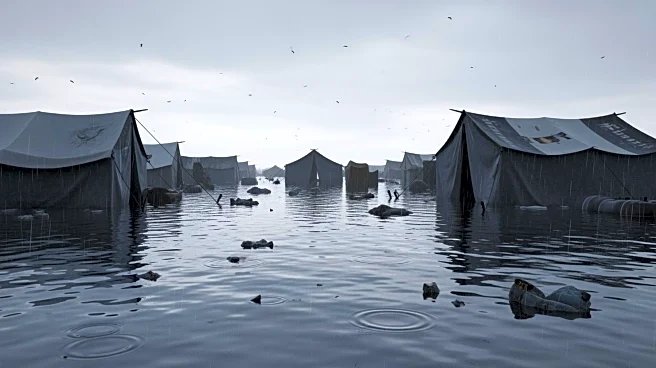What's Happening?
Displaced Palestinians in Gaza are facing severe challenges after heavy rainfall flooded their makeshift tents, leaving their shelters and belongings soaked. The flooding occurred overnight, and officials
in Gaza have received numerous pleas for help, but resources are scarce. Mahmoud Basal, spokesperson for Gaza Civil Defense, highlighted the dire situation, noting that entire shelter centers have seen water levels rise significantly, with mattresses and blankets drenched. The tents, already worn out from previous conflicts, are collapsing under the weight of the rain. The United Nations has reported that hundreds of tents and makeshift shelters have been flooded, and Gaza lacks the necessary equipment for proper flood prevention.
Why It's Important?
The flooding in Gaza underscores the ongoing humanitarian crisis faced by displaced Palestinians, who have been living in precarious conditions due to previous Israeli military attacks. The lack of adequate shelter and resources to manage natural disasters like heavy rainfall exacerbates their vulnerability. The situation highlights the urgent need for international aid and intervention to provide emergency shelter items and improve living conditions. The inability to access necessary aid due to restrictions further complicates efforts to alleviate the suffering of displaced families, leaving them exposed to harsh weather conditions.
What's Next?
The United Nations and other humanitarian organizations are likely to continue advocating for increased access to aid and resources for Gaza. Efforts to negotiate with Israeli authorities to allow more shelter aid into the region are expected to intensify. The international community may also increase pressure on Israel to facilitate the entry of humanitarian aid. Meanwhile, displaced Palestinians will continue to face challenges as they attempt to cope with the aftermath of the flooding and prepare for potential future weather events.
Beyond the Headlines
The flooding in Gaza highlights broader issues related to the impact of climate change and environmental factors on vulnerable populations. The lack of infrastructure to manage natural disasters in conflict zones poses significant risks to human safety and well-being. Additionally, the situation raises ethical questions about the responsibility of international actors to provide aid and support to displaced populations in politically sensitive regions.










